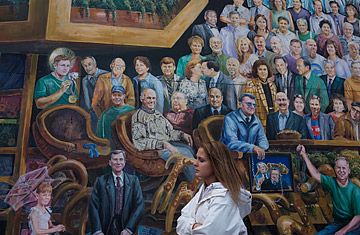
Accused child molester Jerry Sandusky's image was removed, far left, from a mural of Penn State greats. The blue ribbon is a symbol of support for victims of child abuse.
Clarification Appended: Dec. 22, 2011
In the days following the revelations of the sex scandal at Penn State, the horrific details of a football coach's alleged rape of young boys were difficult to believe. The community's response bordered on incomprehensible: students rioting in defense of Joe Paterno, the revered football giant who lost his job as head coach for failing to do more to stop the abuse; alums at a tailgate party, arguing that Paterno's indifference was no big deal and chanting, "You gotta fight/ For your right/ For JoePa!" to the tune of the Beastie Boys classic; the funeral-home director, escorting a grieving man from the room where he had just identified his deceased mother, saying, "Don't you think there has been a rush to judgment on Joe Paterno?"
"From the outside looking in, you can't understand it," says Andrew Hanselman, a senior majoring in marketing, on the close-knit Penn State culture. "From the inside looking out, you can't explain it."
But as more and more campuses confront the cost of an insular culture, the need to understand--and take action--will only grow. In another college-sports capital, Syracuse University assistant basketball coach Bernie Fine was fired Nov. 27 after being accused of molesting at least three boys during his 36-year career.
In places like Syracuse, N.Y.; State College, Pa.; and Columbus, Ohio, college sports are now too-big-to-fail economies, and this has implications for everything from the safety of students to the mission of the universities. "Some campuses have a misguided perspective," says Brett Sokolow, a managing partner at the National Center for Higher Education Risk Management, "that covering these things up will help them in the long term." But if there is a lesson being learned in State College, it is not just danger that comes in the cover-up; it is the risk you face from what you can't see in the first place.
The Happy Valley Bubble
Penn State sees itself as a place that breeds an intense, familial sense of loyalty. It's partly the university's setting--nestled in Happy Valley, the third safest metropolitan area in the U.S., in a town Psychology Today once called one of the least stressful places to live in America. People tend to show up as students and stay forever, in spirit if not in fact. "Even when you leave State College," says Scott Kretchmar, a professor of exercise and sport science who arrived on campus in 1984, "it's attached to you like an umbilical cord." The Penn State Alumni Association, with more than 165,000 members, is the largest dues-paying alumni group in the world. Most senior athletic-department officials are Penn State grads who have worked at the school for decades.
And why would they leave a place where football is cause for epic celebrations that draw more than 100,000 people on Saturdays to the second largest stadium in the western hemisphere, where players are kings and coaches are gods, and none more so than Paterno, presiding for more than 45 years over a $72.7 million empire, the fifth richest among college programs? Penn State football made a $53.2 million profit last year, second only to the University of Texas' $71.2 million. Paterno earned millions from Penn State; he and his wife donated more than $4 million to the school.
